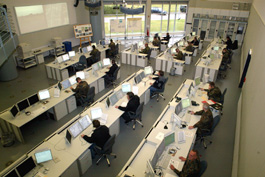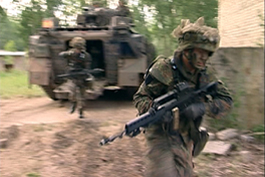Russian Army orders state-of-the-art training centre
The Defence Ministry of the Russian Federation has contracted with the Düsseldorf-based Rheinmetall Group and its Russian partner JSCo Oboronservis to build a major army training centre in Mulino, Russia. Located in the Volga region, by 2014 this simulation-supported training centre – the most advanced system of its kind worldwide – will be able to train 30,000 troops a year. For Rheinmetall the order is worth well over €100 million including further options.
 |
| Source: Rheinmetall Defence |
 |
Source: Rheinmetall Defence |
This contract has special strategic significance for the Rheinmetall Group, representing the German defence industry’s first significant foothold in the Russian market. In light of plans to modernize the equipment of the Russian armed forces, the opportunities for follow-on orders from the Russian Federation are considerable.
Rheinmetall is one of the world’s leading suppliers and operators of simulation and training systems for ground, air and naval applications.
The Group already operates the Bundeswehr’s Gefechtsübungszentrum Heer, or GÜZ, a high-tech army training centre located in the Altmark in central Germany, on which the new facility in Russia will be modelled. A further customer from the Middle East placed an order with Rheinmetall for a comparable facility in 2009.
To execute this project, Rheinmetall has entered into a strategic partnership with JSCo Oboronservis, the Russian company that will serve as general contractor and subsequently operate the facility on behalf of the Russian armed forces.
Simulation-supported training is not only a realistic and efficient means of preparing troops for a variety of operational scenarios, but also keeps cost in check by reducing consumption of fuel and materiel as well as protecting heavy equipment from wear and tear. The Russian military expects the new training centre to pay for itself within the space of a few years.
Rheinmetall is tasked with developing and supplying the live combat simulation system as well as technical implementation of all aspects of the project, including commissioning and quality assurance.
Measuring over 500 square kilometres, the state-of-the-art Russian army training centre in Mulino is designed to train a reinforced mechanized infantry or armoured brigade. An innovative rotation principle will enable training to take place simultaneously at a variety of stations, with the training system tracking and recording the activities of each participant via an electronic identification badge, helping to assure successful results throughout a training process lasting several weeks.
Preceding the rotation principle, which will be employed in Mulino for the first time, will be an introductory qualification phase involving practical and theoretical objectives whereby the theoretical level of qualification presented in the form of CBT modules. Participants will not be allowed to proceed until they meet this basic qualification, after which they move on to other training stations, including live combat simulation, commander training by state-of-the-art constructive simulation, marksmanship with modern firing ranges as well as other practical training components. Another new feature is the networking of Live, Virtual and Constructive simulation elements in an LVC system which promises to set a new standard in military training.
During live combat simulation, formations and units will soon be able to train for military operations using laser simulators and cutting edge communications technology mounted onto their original equipment and tactical vehicles, which will be able to range at will in a approximately 200-square-kilometre zone. Live fire will be simulated by eye-safe laser simulators for all weapons, ranging from small arms and light antitank weapons to tank guns, artillery, IFV-mounted automatic cannon, etc..
Following the training programme, which lasts several weeks, every brigade that passes through Mulino will have attained a comparable, certified level of proficiency. This takes into account the Russian military’s aim of ensuring that every brigade is optimally prepared for the realities of modern warfare.
Realistic simulation thanks to innovative technology
Continuously perfected by Rheinmetall engineers, the sophisticated training technology installed at the GÜZ combat training centre in Letzlingen, Germany, has proved invaluable to the Bundeswehr ever since operations began in 2001.
During live training operations, every participant in an exercise, from individual soldiers to main battle tanks is equipped from the start with laser sensors and compact data transmission devices.
These wireless devices feature a GPS satellite receiver and constantly transmit information concerning the position and status of every participant to the exercise control cell. When training for military operations in urban terrain (MOUT), special sensors track the position of soldiers even when they are inside buildings. The effects of heavy weapons fire on buildings and the troops inside them can also be simulated. Moreover, mobile video teams accompany the participating units, transmitting imagery back to headquarters in real time. There, the complete array of data from an exercise flows together, including all voice transmissions. The position and status of all exercise participants are depicted on workstation computer monitors and large screens on a 2D/3D situation map, including video recording in real time.
All events taking place during major exercises are electronically recorded and processed for subsequent after-action review (they can be presented to exercise participants in a fixed-position auditorium or in mobile facilities in the major training area).
Simulation technology from Rheinmetall thus makes a decisive contribution to well-grounded, deployment-oriented training, providing troops with the best-possible preparation for carrying out their missions, a critical factor in assuring adequate force protection and favourable outcomes.

 von
von